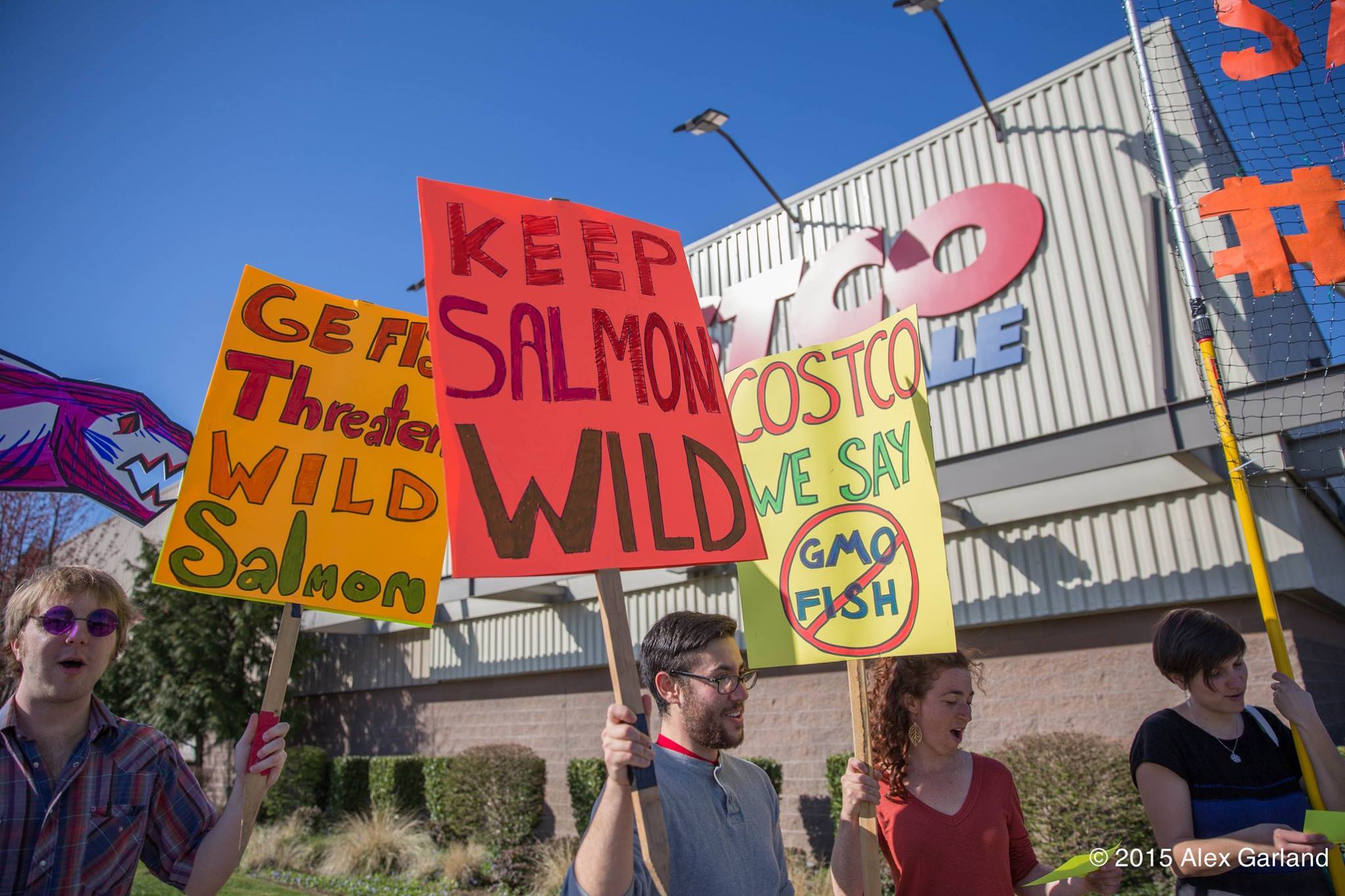- Blog
- Sustainable Economic Systems
- Will Costco be the GMO salmon store?
Will Costco be the GMO salmon store?

Donate Now!
Your contribution will benefit Friends of the Earth.
Stay Informed
Thanks for your interest in Friends of the Earth. You can find information about us and get in touch the following ways:
On the heels of the introduction of Sen. Murkowski’s (R-Alaska) bill last week to crack down on the potential introduction of GMO salmon, Costco is at a crossroads. Will it join its grocery competitors and reject AquaBounty’s GMO salmon, currently pending FDA approval, or will it welcome the first commercialized genetically engineered animal onto its shelves and become “the GMO salmon store?” A coalition of consumer, environmental and labor activists recently held a protest in front of Seattle’s Costco to pose that exact question to the grocery and wholesale company on its home turf.
The groups organizing this event included Friends of the Earth, Community Alliance for Global Justice, Food and Water Watch, Loki Fish Co., members of Pacific Northwest indigenous tribes and UFCE Local 21. They were joined by concerned consumers and Costco customers to deliver more than 50,000 petition signatures asking the company to uphold its values in sustainability and decide to keep this salmon off its shelves. Costco’s general manager would not receive the petitions, so groups now plan to deliver them directly to headquarters.
Members of UFCW Local 2 joined the protest
Costco is one of the last major regional and national grocery stores that has not yet committed to not carry this inadequately tested, unlabeled GMO salmon that poses risks to wild salmon, the environment and human health. Already, more than 60 retailers, representing over 9,000 grocery stores across the United States, have committed to not sell the GMO salmon should the FDA approve it. Last spring, Kroger and Safeway, the largest and second largest grocery chains in the country respectively, signed on to the pledge, joining other chains such as Trader Joe’s, Whole Foods, Target, Aldi and H-E-B. Costco, with its 474 U.S. locations, remains one of the largest and last grocery chains to stay on the salmon fence.
In email responses, Costco’s customer service told customers that it has no plans to source the GMO salmon. Publicly, however, it has fallen short of issuing an official company commitment — and has declined to answer press inquiries. Without a public commitment, Costco leaves open the door to a product that tens of thousands of its customers have already rejected (not to mention the nearly 2 million people — including scientists, fishermen, business owners, and consumers — who have written the FDA opposing the approval of genetically engineered salmon, and the three-quarters of Americans surveyed in a New York Times poll who said they would not eat genetically engineered fish).
Pete Knutson of Loki Fish Co., speaking at Costco
In fact, the issue is especially pertinent for Costco, as the company is based in the Pacific Northwest, in Issaquah, Washington. The area’s salmon populations could potentially be threatened if any GMO salmon, engineered to grow larger than wild salmon and to full size in just 16 to 18 months, should ever escape. If a GMO salmon were to escape from AquaBounty’s control (which is not unlikely given its documented irresponsible management of its Panamanian GMO salmon facility) studies suggest that wild salmon could go extinct within just forty generations. This could have significant impact on the thousands of wild salmon fishermen and Native American tribes. Even more broadly, FDA approval of the GMO salmon could set a worrying precedent for the dozens of other genetically engineered fish waiting in the approval pipeline.
Owner of the Seattle-based Loki Fish Company, Peter Knutson, says that the GMO salmon should stay out of the Pacific Northwest. Instead of supporting new salmon that could threaten native populations, the focus should be on restoring Northwest salmon populations to their prior abundance. “Far from being a substitute, genetically engineered salmon are a scheme to enrich the few at the expense of our natural legacy.”
Similarly, members of the region’s indigenous tribes have raised concerns over the potential risks a GMO salmon would bring to the Northwest’s marine ecosystems. Nahaan, who is Iñupiaq, Paiute and Tlingit, and is of the Dakhl’aweidi clan from Klukwan, Alaska, spoke out in a statement against reducing salmon to a mere resource to be generated. “Too often the machine of profit has overtaken the actual means of what is sustainable and lasting for the earth.”
At the rally, protesters and a marching band gathered at the edge of the parking lot of Seattle’s Industrial District Costco location to deliver the 50,000 petition signatures to a Costco representative. Chanting “Hey, hey, don’t delay! Costco, sign the pledge today!” and chatting with customers coming to and from the store, the group made clear the simple choice Costco has yet to make. Will the company join its competitors in a commitment to sustainable seafood by keeping genetically engineered salmon off its shelves or will it be known as the “GMO salmon store?”
Image credits: Protest outside Seattle Costco, copyright Alex Garland
Take action: Tell Costco to say commit to not selling the GMO salmon
Learn more about GMO salmon: www.gefreeseafood.org


